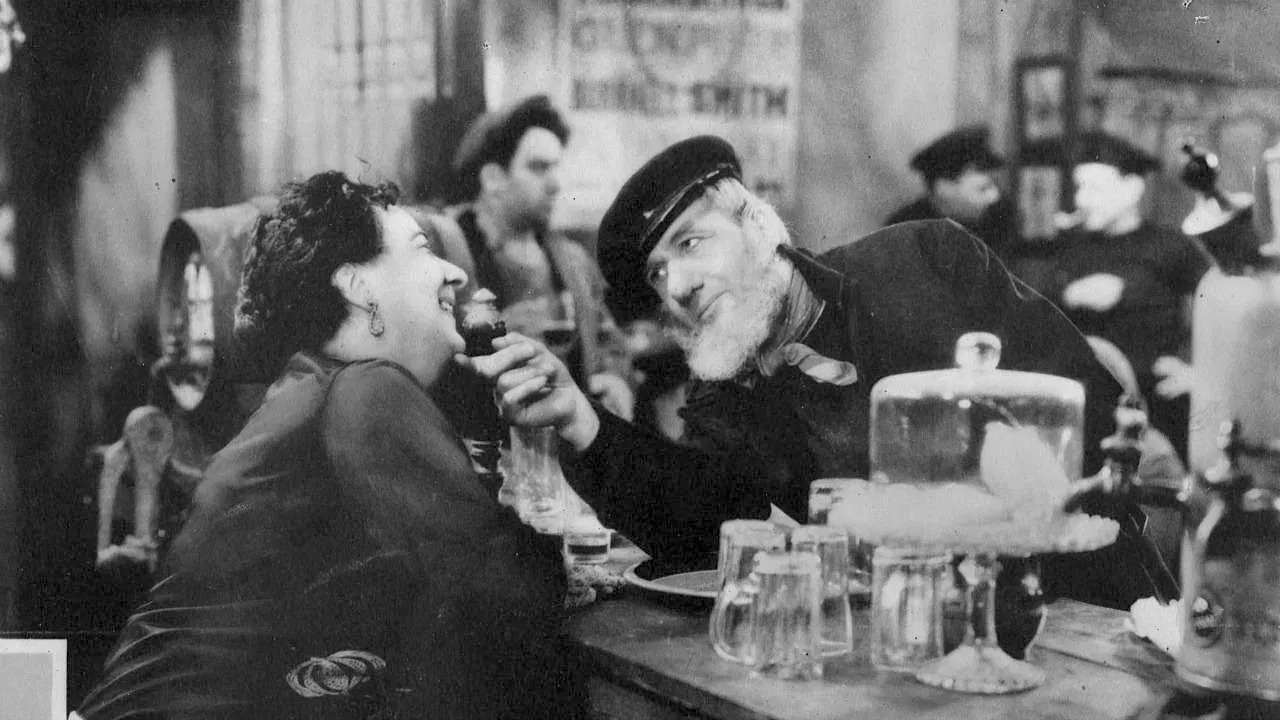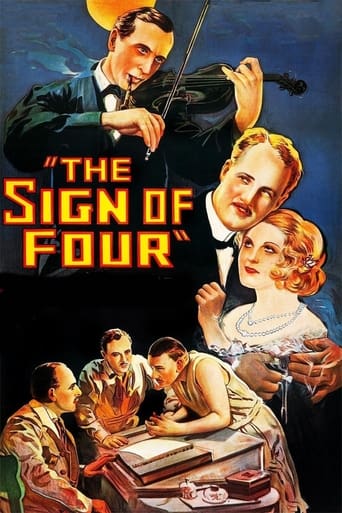

Excellent adaptation.
... View MoreHow wonderful it is to see this fine actress carry a film and carry it so beautifully.
... View MoreIt’s fine. It's literally the definition of a fine movie. You’ve seen it before, you know every beat and outcome before the characters even do. Only question is how much escapism you’re looking for.
... View MoreIt is interesting even when nothing much happens, which is for most of its 3-hour running time. Read full review
... View MoreArthur Wontner was for many years considered 'the critics choice' as Sherlock Holmes, in England at least. Although Basil Rathbone et al had not yet appeared this claim was not unchallenged, as previous nominees for the top position in this part had also been considered pretty weighty; in the silent era Eille Norwood had made over forty films as the great detective in Britain, John Barrymore followed, Clive Brooke and Raymond Massey appeared in early talkie versions of the character and William Gillete was wowing audiences with his stage version, personally OK'd by Sir Arthur himself. Being a Londoner I could understand the cockney accents,unlike some of the reviewers though these were seldom portrayed correctly even in British films; in those days characters were either 'posh' or 'common', with little in between. I like the quiet scenes in 221b Baker street rather more than the action sequences in 'Holmes' films, though the chase across the Thames was good in this film, and the fight a little less inspiring as it had been sped up in the manner of some films of the time. Yes, there were some brilliant portrayals of Holmes in later years but I still have a soft spot for Arthur Wontner, who incidentally probably looked more like the original Sidney Paget drawings in the Strand magazine than anyone else. It's a pity that this particular series of films is so badly represented in these dire copies, several generations away from the original. I can assure the manufacturers of the 'Wontner' DVD's that there are decent prints of these films out there if you can be bothered to look.
... View MoreI am a huge Sherlock Holmes fan. I've read all the stories and up until the Jeremy Brett series was created, I always felt that those who created the Holmes films had a lot of contempt for the original material. The modern image of is simply NOT the Holmes created by Conan Doyle. While this film starring Arthur Wontner did have Holmes uttering the "elementary" phrase again and again and that pipe was also present, this was about as close to the Conan Doyle you could find until the 1980s. Most casual viewers don't realize that up until Granada Television made the films with Brett, the Sherlock Holmes being portrayed in films was more an imitation of William Gillette than Holmes. Gillette had made a career of playing Holmes on stage and in silent films and he liberally changed the character to make it his own--not Conan Doyle's.While far from perfect, this low budget Sherlock Holmes film at least tried more than most subsequent films--being much closer to the source material than the Basil Rathbone films or even the later Wontner films (SILVER BLAZE was a bit of a mess). I especially like how that accursed deerstalker hat (with the double bill) isn't worn by Holmes like it was in most other films (but not in most of the original stories) and how Lestrade and Moriarty aren't present (they were only in a small number or stories). Those who read SIGN OF THE FOUR would recognize the original story--the same can't be said of Wontner's SILVER BLAZE.The only serious negative about the film is its quality due to the ravages of time. Being in the public domain, it has been copied and re-copied again and again and by now it's a bit of a struggle to watch and the print is a tad fuzzy. However, being slightly hard of hearing and an American, I was STILL able to follow it reasonably well, so it's likely the film will be very watchable for you.
... View MoreI always go into a Sherlock Holmes film expecting the best, but fearing the worst. With "The Sign of Four", my fears for the worst were unfortunately realized. Poor production values and a largely unintelligible sound quality contributed to my difficulty in following the story. But where I really lost it was when Sherlock Holmes (Arthur Wontner) was able to determine that a note sent to florist Mary Morstan (Isla Bevan) was written by an amputee, because the letters STAND UP on their own legs! With that line, the film immediately made it to my Top Ten Worst list without Passing Go, with the dubious distinction of joining my previously worst ever film - "The Beast of Yucca Flats". At least with The Beast, there's a lot to ridicule. Here, one doesn't know what's to be taken seriously and what's to be taken in good clean fun.With "The Sign of Four", nothing is "Elementary My Dear Watson", especially in Ian Hunter's portrayal of the acclaimed detective's accomplice. Watson fancies himself a romantic, and quite literally gets the girl at the end of the film. By that time my interest in the movie was gone, although I was jolted at inopportune moments by the appearance of a tattooed man and a black man with a snake around his neck. By the time they got to the speedboat chase, I was glad I had a bottle of brandy beside me.I'll admit the mystery started reasonably enough before getting bogged down in unbearable boredom. To be fair, I probably should give the film a second viewing, but it will be a long while before it comes to that. Until then, "The Sign of Four" doesn't even hit that numerical equivalent on my radar screen, and they don't allow negatives here. So for now, it's just a +.
... View More(Some Spoilers) Feeling guilty and having an attack of the shakes with the knowledge of one-legged master criminal Johathan Small,Graham Sutten, breaking out of prison old and infirmed. Major john Sholto,Herbert Lomas, calls his two sons Thaddeus and Bartholomew, Miles Malleson & Kynaston Reeves, into his study and tells them a story about his dark past that he kept from them all these years.The Major is a both thief and murderer who killed his fellow British officer Captain Monstan, Edger Norfolk, back in India when they discover a buried treasure chest of jewels and pearls in an empty and abandoned ancient castle.Given instructions to the buried treasure by interned British solider Small Major Sholto not only murdered his partner Captain Monstan but left Small out in the cold and behind bars, whom he promised to left go free, taking all the loot for himself. Now feeling that the end is near and wanting to clear his conscience Major Sholto instructs his sons to return the treasure to the deceased Captain Monsta's daughter Mary, Isla Beuan. A florist in London's Weat End district. The end comes sooner then Major Sholto thought when Small pops up in his window which causes him to suddenly die of a heart attack. Small getting together with a gang of weirdos that he recruited out of the local circus the Tattoed and Tonga the Snake Man, Roy Emerton & Toga, plan to get Major Sholto's treasure by first finding out when he hid it from his sons Thaddeus & Bartholomew. Then get Mary to give him the pearl necklace that the deceased major mailed to her just before he died. After a close call from The Tattoed Man, who came to her store to buy flowers, Mary goes to private detective Sherlock Holmes, Arthur Wontner, for help and protection which she gets but also falls in love with his friend and assistant the dashing and dynamic Dr. Watson,Ian Hunter, as an extra bonus.Early Sherlock Holmes movie with a witty and super observant Holmes, the guy can tell if someone is missing a limb or not just by studying his handwriting, using both his brains and his boxing skills, Sherlock throws a really wicked left hook, to solve the case and save the girl from a bunch of murderous villains. The Small gang take out brother Bartholomew with a blow gun, curiosity of the Snake Man Tonga, after getting the information from him where the treasure was hidden by his late dad Major John Sholto. But Small is still not satisfied and wants the pearl necklace that's with Mary who's being protected by Sherlock Holmes and the London PD. Kidnapping Mary the trio of criminals, Small The Tattoed and Snake Man, make it to the London docks. There together with their contact to get them out of the country warehouse and speedboat driver Mordecai Smith, Moor Marriott,race up and down down the Thames ending in a free for all at Smith's warehouse. With the one-legged Small disappearing under the waves. In the end Shurlock Holmes as usual ends up solving the case and getting his man, or men, but it's the usually bumbling and fumbling Dr. Watson who end up getting the girl.
... View More